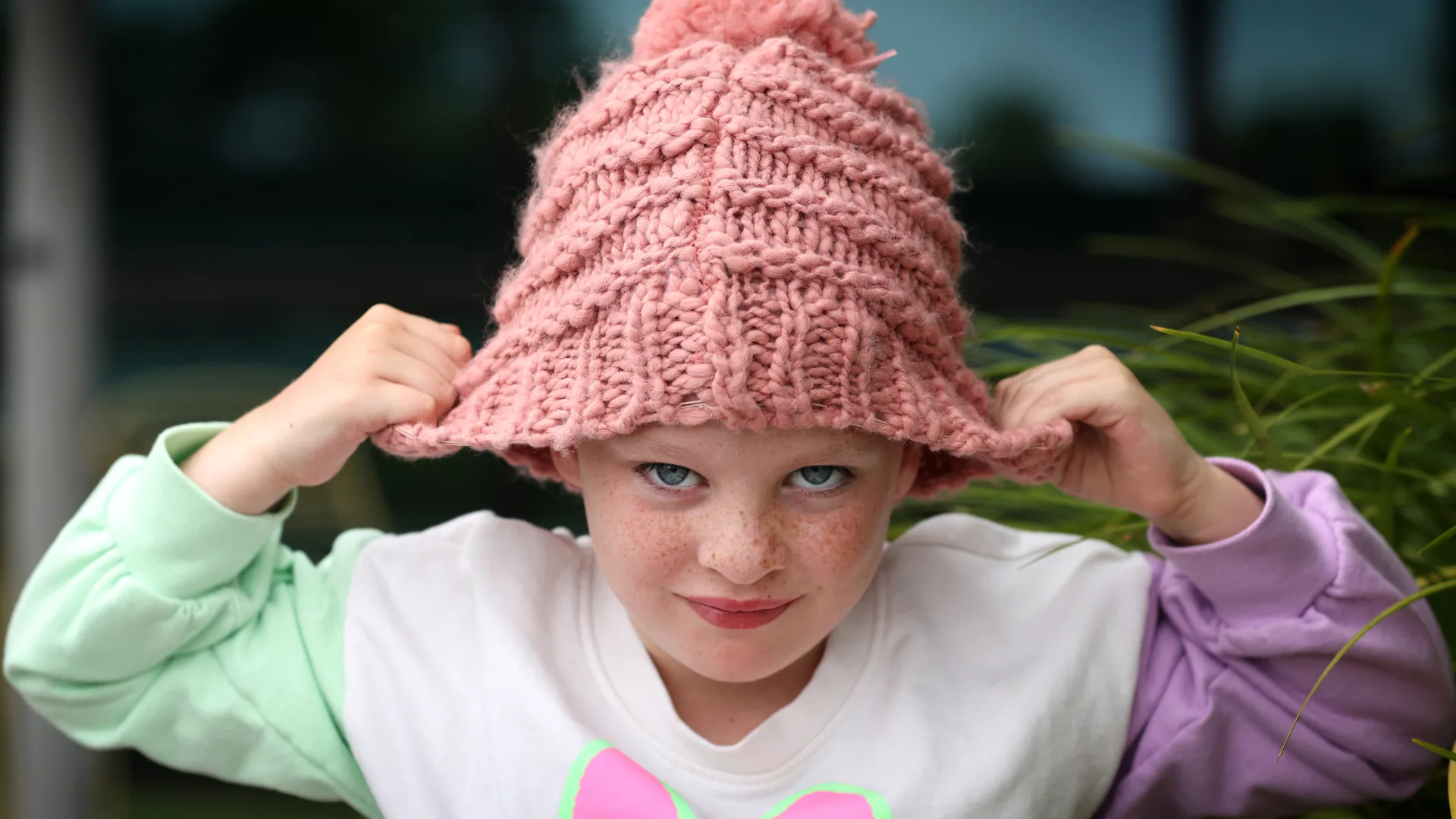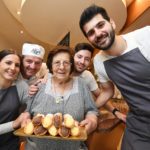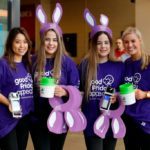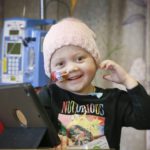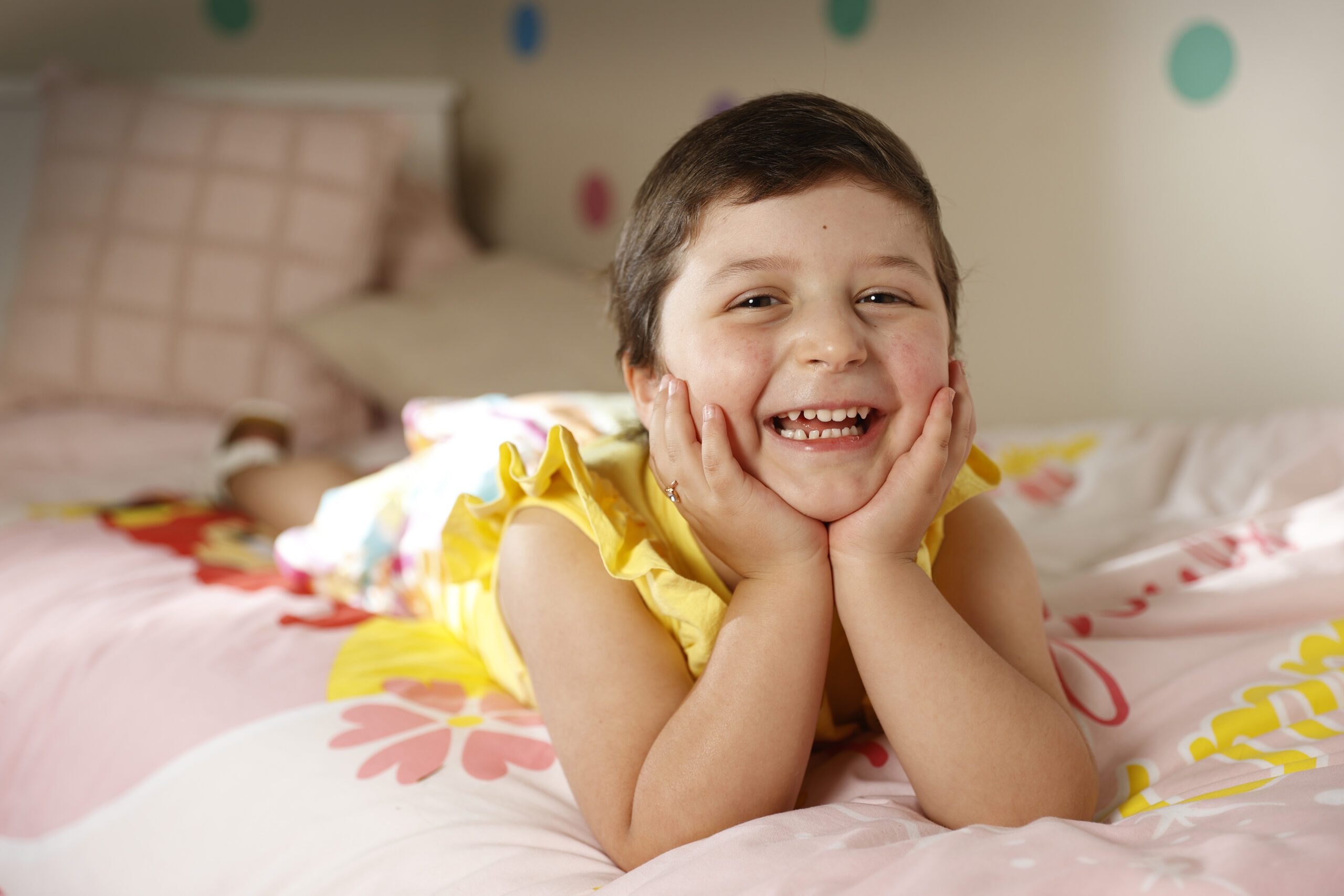
Amelia the Brave
Amelia is spreading awareness about childhood cancer, even as she faces her own leukaemia battle, and its down and up days, with a superhero smile.
It’s a simple happy snap in the daycare playground. A three-year-old looks straight into the camera lens, her eyes crinkled with excitement.
Amelia’s perfectly white toddler teeth peek out from a wide, full-cheeked smile. Her waist-length brown hair has been tamed into two neat plaits. Perched atop play equipment, it is the epitome of childhood live-in-the-moment happiness.
But for the Nesci family, the photograph is so much more. It captures a moment in time, after which nothing would ever be the same.
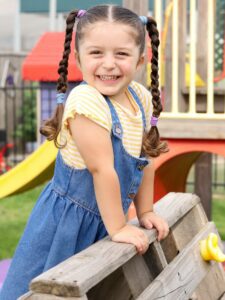
Following this photo (right), Amelia suffered a month-long health deterioration and merry-go-round of doctors visits. What started as a suspected lingering daycare cold, ended 25 days later with her being carried – passed out – into the emergency department of The Royal Children’s Hospital.
She was then diagnosed with acute lymphoblastic leukaemia.
But instead of being a heartbreaking photo of good times and what might have been for parents Nadia and Anthony, the image of their darling daughter and second youngest child has instead been transformed into a positive project – children’s book Amelia the Brave.
This cartoon alter-ego has one mission; to give a child-friendly and gentle look into the world of childhood leukaemia.
Nadia’s original idea was to write a book and print one copy at Officeworks to help explain to Amelia’s daycare and kindergarten friends why she had suddenly disappeared.
More than 500 copies later and a second print run, plus the family’s fundraising efforts, will see them soon top $20,000 in donations to the Good Friday Appeal.
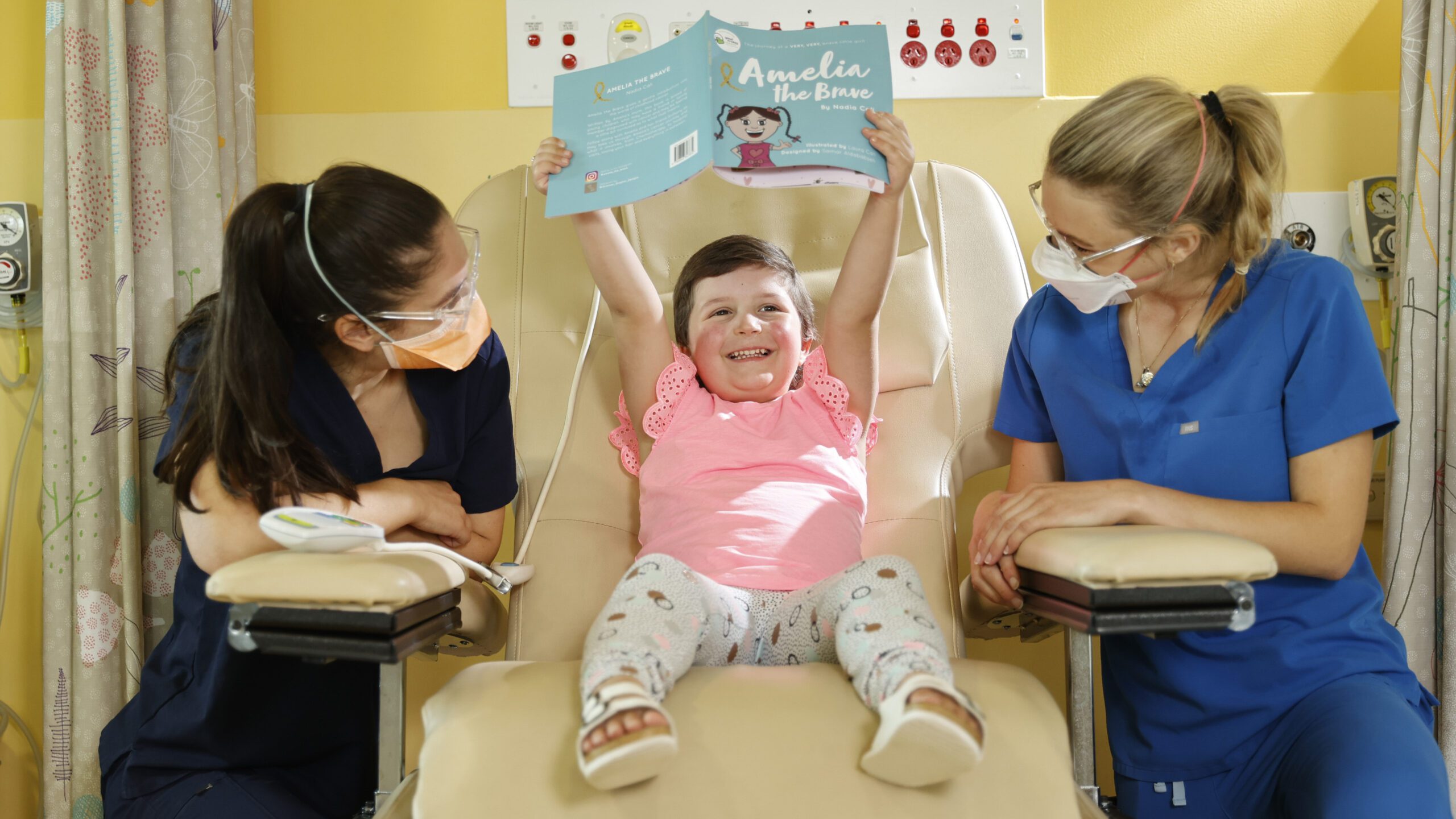
Amelia the Brave is not only spreading awareness that each day more than two Australian children will be diagnosed with cancer, it is also empowering Amelia to step up to this superhero role.
“When she was crying in those early days and asking, ‘Why me?’, all we kept telling her was, ‘You’re so brave, baby’. It just stuck,” Anthony says.
“With each hospital visit and each time she finishes her medicine, I think she believes the brave part now.
“Just with her demeanour and the way she carries herself, especially in the hospital now, she knows what’s expected, what’s going to hurt and what isn’t going to hurt.
“For her, at age four, to go ahead and do it the way she’s doing it, she is our hero.”
Amelia’s little brother, Marcello, had not long started daycare last year when lingering sickness entered the Nesci household.
No sooner than Amelia would get over a cold, another one would hit. But on May 1, she woke up with a stomach ache, one so bad that she couldn’t get up from the couch.
Anthony took her to the emergency department, where an ultrasound showed constipation was the likely culprit.
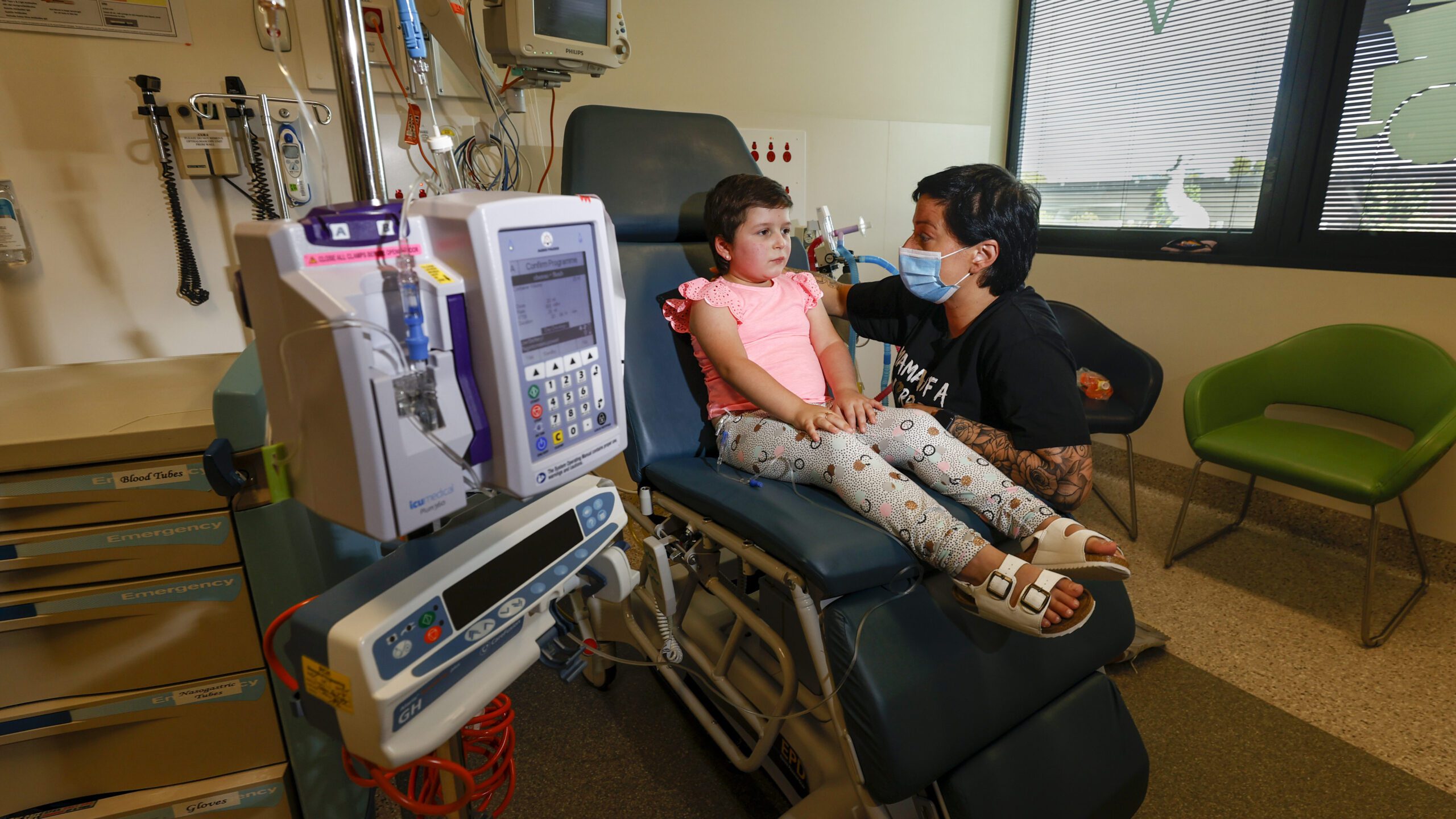
From that day, over the next month, her health declined. They saw five GPs in that time, with each suggesting a different diagnosis as varied as worms to an iron deficiency.
On May 25, Amelia – who by this stage was crying each day and a shell of herself – got a blood nose at 9am that could not be stopped. At 10am, they drove straight to the RCH. She fainted as she got out of the car. Barely two hours later the cancer diagnosis came.
“I remember asking one of the oncologists: ‘Are you sure? Is it possible that you may have made a mistake?’” Anthony says.
“I was just clinging onto something. It was surreal. I’ll never forget that day and I want to forget that day.”
The ripples of a cancer diagnosis reach far beyond just the child being treated and the parent who needs to be by their side in hospital.
Given cancer therapy typically takes several years to administer – even when everything goes to plan – a family often survives on begged and borrowed favours for everything from helping care for siblings, getting a meal on the table, looking after pets, and even paying bills.
For the Nesci family, it saw sisters and sisters-in-law step in to look after the other three children, a tough task given Marcello was just one when his parents and closest sister disappeared from his life for lengthy periods.
A fundraising drive by family and friends raised enough money to ensure Nadia could extend her maternity leave to be with Amelia.
It has meant relying on the generosity of Anthony’s workplace for extra time off, which allowed him to keep his family together and the household functioning while Amelia endured the most intensive treatment phases isolated in hospital.
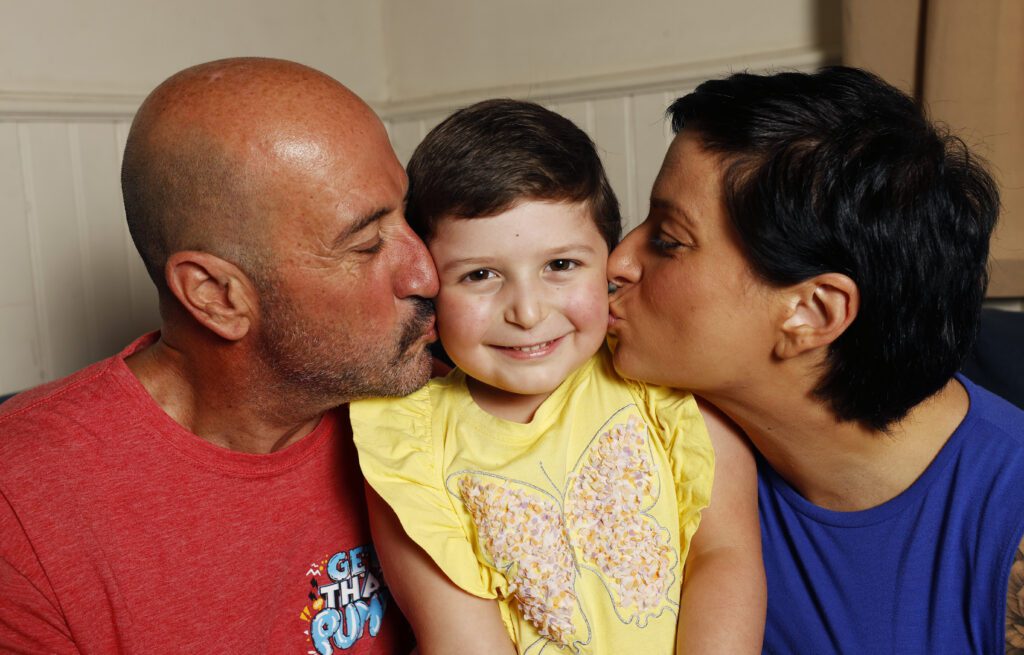
A cancer diagnosis can also change relationships.
Amelia has always been a “Daddy’s girl”, with the family joking father and daughter had always been “joined at the hip”.
But after she got sick – like many children – Amelia only wanted her mum for comfort.
“That’s one thing that Anthony, still now, he struggles with,” Nadia says.
“She was angry a lot. She wanted me all the time. That was even weird for me. Because she was always with him previous to that. Now she’s come a long way, she’s back to being Daddy’s girl again.”
When Nadia would return home from hospital periodically during the first few months of treatment, baby Marcello would refuse to let go of his Mum.
Aaliyah, 11, still has weekly counselling. “She needs to vent and talk to someone other than us. There are always lots of questions,” Nadia said.
In the early days of diagnosis and treatment, Amelia refused to talk about it. It was her way of coping.
Her family needed to pick their moments, and find a way of being honest and upfront with what has happening, without overwhelming her.
Nadia read a children’s book to her about a boy who had leukaemia. This book sparked the idea that she needed to write her own version with a female lead character. But it was the page where the character loses his hair that made her daughter start crying.
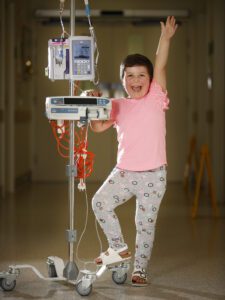
“Amelia, because she didn’t understand the connection between cancer and death, she was more focused on the hair loss,” Nadia says.
“She was worried people would laugh at her for having no hair.
“Aaliyah was more focused on the death side of things. That was the first question she asked me: ‘Is Amelia going to die?’
“I remember there were a lot of tears and saying along the lines of: ‘We will do everything we can to make sure that doesn’t happen. That’s all I can promise.’
“I said, ‘I don’t know what’s going to happen’. At that stage we didn’t know what type of leukaemia it was, what genes were involved, because that makes a big difference in terms of the percentage of survival rate.
“Luckily Marcello has no idea. He’s too young. He won’t remember any of this.
“We’re very open and very honest with our kids, and we don’t sugar coat things and we don’t hide things. They are very aware of everything. I don’t want them to be surprised by things. The more they know, the better.”
THERE is a bright green sticker on the bag of IV liquid dripping into Amelia’s bloodstream that Nadia can barely look at. It makes her too furious.
“For intravenous use only,” it reads. “Fatal if given by other routes.”
And yet this chemotherapy – deadly if it enters the body another way – is Amelia’s lifeline.
A big driver for the couple’s fundraising and awareness raising is to see pediatric cancer treatments improve so they can be more effective and less toxic on little bodies.
“So much more needs to be done for childhood cancer,” she says.
“Our kids are receiving chemos and dosages that were created in the 1960s. It needs to change because so many children who have cancer aren’t even dying from the cancer, they’re dying from the chemo. It’s that toxic.
“There are significant after-effects of chemo. Amelia will need yearly heart scans until she’s 21. She’s only 4.
“Even though her treatment ends next year in August, we’ve got years of things ahead of us.”
CANCER may be a cloud that will continue to hover over the Nesci family for the foreseeable future, but they are still working hard to find the silver linings.
For Anthony, the experience has confirmed the importance of connecting with their four children.
“It’s made us stronger and tighter. I don’t want to do things with other people at the moment. I just want to keep everyone in my family within reach. That’s all I care about,” he says.
“It’s only the last couple of weeks we’ve had some family birthday parties. We declined Christmas and all family functions, and because we’re Italian there are a lot of events. We’ve done nothing in well over a year.
“It’s a little bit weird, and a little bit relieving to get out again now. The kids have loved it.”
For Nadia, cancer has confirmed to her what is important in life – people and memories.
“When childhood cancer happens, and I’ve discussed this with a lot of the other mums, you look at everything completely different,” she says.
“All the things that used to stress you out and worry over, when I say they mean nothing now, they really don’t.
“I used to get angry and frustrated when the kids would be on the kitchen table painting and making a mess, throwing things on the floor. I’d be frustrated at the cleaning that’s involved.
“Now I don’t care. Taking photos of them doing that, putting those paintings up on the wall, all of that is what matters.
“What matters is the people under this roof; everyone is happy and as healthy as they can be. Nothing else in this world matters, other than that. Cancer puts everything into perspective.”
What they’ve been through in the past year has also reinvigorated their drive to give back to the place that is treating their daughter.
“We’re doing this (telling our story) because The Royal Children’s Hospital saved my daughter. It’s as simple as that,” she says.
“We’ve been told if we didn’t bring her in that day she probably would have just another week or two left.
“All I kept thinking was thank God she got that blood nose, because we were just persisting at home trying to fix her ourselves because that’s what the doctors were telling us to do.
“They have saved my daughter. They continue to save her every day.
“The amount of the kids we’ve met now that they have saved, and continue to save every day, we owe that hospital everything – everything.”



